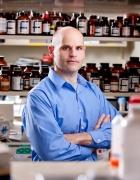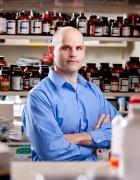
Credit: Douglas Levere, University at Buffalo
BUFFALO, N.Y. — A class of proteins that has generated significant interest for its potential to treat diseases, has for the first time, been shown to be effective in reducing relapse, or drug-seeking behaviors, in a preclinical study.
Published online in July in Biological Psychiatry, the University at Buffalo research reveals important new information about the molecular changes that occur in the brain when an individual takes cocaine, and how these molecules can be targeted to reduce drug-seeking behaviors during withdrawal.
"One of the greatest challenges with addiction is the persistent vulnerability to relapse," said Craig Werner, PhD, first author on the paper and a postdoctoral fellow in the Department of Pharmacology and Toxicology in the Jacobs School of Medicine and Biomedical Sciences at UB. "We know that relapse rates have remained very stable despite many medical advancements, so the big question is, how can we better understand drug addiction so that we can reduce the risk of relapse? We wanted to look at withdrawal and to see what happens in the brain that maintains these relapse behaviors."
Werner is a researcher in the laboratory of David Dietz, PhD, senior author and chair of the Department of Pharmacology and Toxicology.
The publication focuses on a class of proteins called E3 ubiquitin ligases, which work by tagging other proteins to be degraded.
"We are the first group to look at this class of proteins in drug addiction," said Werner, noting that this class of proteins regulates the degradation of specific sets of other proteins in a highly selective manner. "If you indirectly affect a protein through one of these E3 ubiquitin ligases, you can modulate a signaling pathway without targeting it directly."
What is also exciting about these proteins, he said, is that they are changed in disease states. "So the goal is to figure out how to return expression back to what they are in non-disease states, or in this case, how to return the neuroadaptations back to the non-addicted state," he explained.
The targeted protein they studied is known as Smurf1, short for Smad ubiquitinylation regulatory factor 1. Werner and his colleagues found that cocaine addiction in lab animals caused a decrease in Smurf1 and that after addiction, during the withdrawal period when the animals were deprived of cocaine, there was a reduction in Smurf1 protein.
"We think the cell uses this protein, and those that it interacts with, to maintain vulnerability to relapse," he said. "So we hypothesized that if we increased Smurf1, we could make the animals less vulnerable to relapse and actually reduce cocaine-seeking behavior."
When the researchers used viral gene therapy to overexpress Smurf1 in the animals after they had been exposed to cocaine, it reduced the relapsing behavior.
"When we reversed what cocaine does to the brain, by reversing Smurf1 levels, the animal reduced their drug-seeking behaviors," D
Werner and Dietz said that the next step is to conduct more studies on the role of Smurf1 in addiction and other proteins in this class with the hope that such studies will provide the foundation for an effective therapeutic intervention for drug addiction.
###
The National Institutes of Health funded the research.
Co-authors with Dietz and Werner are Rathipriya Viswanathan; Jennifer A. Martin; Pedro H. Gobira; Swarup Mitra; Shruthi A. Thomas; Zi-Jun Wang; Jian-Feng Liu; Andrew F. Stewart; Jun-Xu Li and Amy Gancarz, all of the UB Department of Pharmacology and Toxicology program in neuroscience, and Rachael Neve from Massachusetts General Hospital.
Media Contact
Ellen Goldbaum
[email protected]
716-645-4605
@UBNewsSource
http://www.buffalo.edu
Original Source
http://www.buffalo.edu/news/releases/2018/08/013.html





